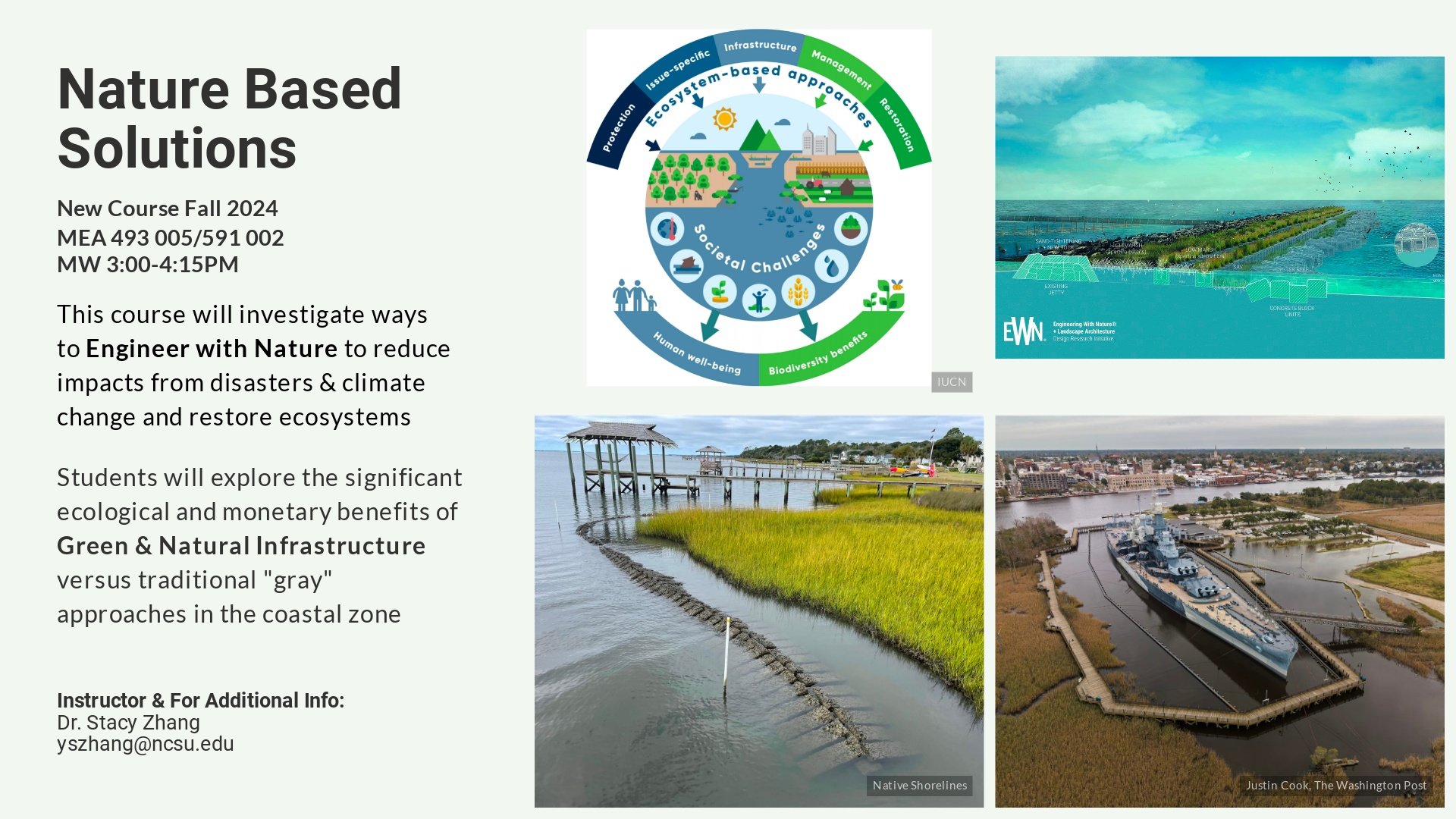NEW COURSE OFFERING! Fall 2024
MEA 493 005 / MEA 591 002 MW 3:00-4:15PM
This course will primarily focus on coastal communities and ecosystems. The course will utilize lectures and discussions of case-studies of ongoing projects (e.g. flood control efforts at the battleship memorial in Wilmington NC) to examine the science, the application & implementation, and policy initiatives that emphasize the use of natural infrastructure in coastal resilience initiatives. There are no prerequisites for the class at this time.
Teaching Statement
Teaching Philosophy
Education and learning are concurrent endeavors where both students and instructors must constantly evolve. Being adaptive to the needs of students while maintaining the expectation that all students have the capacity to learn and provide meaningful contributions is critical to being a successful instructor and mentor. As an educator, I seek to be a facilitator to learning rather than a provider. In the words of Rudyard Kipling, we should all seek to cultivate thinking as a hobby.
Approach to Teaching
In order for a course to be effective and meaningful for students’ education, it is necessary that both the instructor and the student be engaged and fully present while in class. In this sense, I expect students to come to class prepared and actively participate in the course. It also means that as an instructor, I must adapt while in class by observing the emotions and expressions displayed by students whether that is a nod, a confused brow furrow, or a smile and adapt to fit the students' needs.
To facilitate active engagement and participation in the courses I teach, I incorporate a multitude of fun, low-stress activities for students that allow them to not only work with each other but also be responsible to one another in addition to the instructor. For example, I use “jigsaws” where students are divided into groups and assigned papers to read. The students then share the paper he/she read with a group of students that did not read the paper. Within lectures, I also build in portions of time to stop and allow students to summarize the major points of the lecture both individually via minute papers and as a class by writing the points on the board. These formative assessments further provide students and me a moment to reflect on whether there is any confusion regarding lesson objectives or material.
I believe that both students and instructors can become consumed with providing and regurgitating course material to the point where they no longer see the forest for the trees. I actively work to avoid this scenario by incorporating relevant, interesting links and updates at the beginning of lectures from current news sources or social media in order to facilitate the student’s ability to make connections between the material and its applications outside the classroom. Another method I have employed to make course material relatable is by connecting researchers (e.g. authors of scientific papers assigned for reading) to the classroom via videoconference, so students can link a face to the research as well as directly ask the researchers questions they may have.
Experiential Learning
In the sciences, learning is enhanced by visual and tactile experiences. Providing opportunities for students to directly engage with the material is essential, whether this is via interactive laboratory activities, field excursions, or educationally relevant documentaries. You can discuss cloning, but you don't understand the process of how it works until you pipette reagents and plate cells. You can lecture about seagrasses, salt marshes, and coral reefs, but nothing reenforces the concepts quite like directly seeing one for yourself.
Unfortunately, not all students have the ability to enroll in travel courses, and many schools do not have the resources to teach molecular techniques. This is why I believe it is incumbent upon educators to constantly find and create opportunities for students to practice and experience the concepts taught in the classroom . In the courses I have taught, I have striven to provide these opportunities for students by organizing free field trips to field stations, museums, and neighboring laboratories.
Teaching Experience
Instructor of record
Ecology of Coastal Resources (NCSU, MEA 469) - Spring 2023
Land and Seascape Ecology (NCSU, MEA 493) - Fall 2023
Co-instructor
Marine Ecology (DUML) - Fall 2015 & 2016
Caribbean Marine Ecology (Field Course in St. John, USVI) - Spring 2016, 2017
Tropical Ecology (Field Course in Belize) - Spring 2018
Teaching Assistant
Marine Megafauna (Duke University) - Spring 2015
Molecular Biology (DUML) - Summer 2015 & 2016

